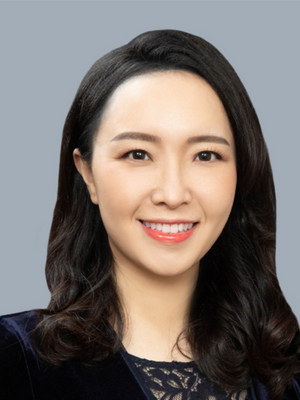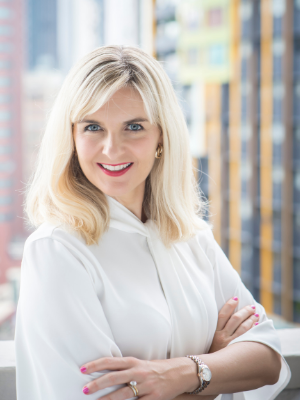 “Don’t be afraid to take the road less traveled, because as you do, you will find new horizons that will take you to the next level,” says Helen Chang. “Finding something you’re passionate about is important because you’ll do better than if you’re forcing yourself into a career or role that isn’t the best fit for you.”
“Don’t be afraid to take the road less traveled, because as you do, you will find new horizons that will take you to the next level,” says Helen Chang. “Finding something you’re passionate about is important because you’ll do better than if you’re forcing yourself into a career or role that isn’t the best fit for you.”
Chang shares her journey about the benefit of international perspectives, taking on new opportunities to evolve and inspiring yourself and others through passion.
Growing Your Career from Outside the Comfort Zone
Born and raised in Hong Kong, Chang went to boarding school in the UK, attended college in Canada and then started as a trainee at JP Morgan Chase where she gained exposure to various areas of banking. She then obtained her MBA at Yale University. Living abroad at an early age, she developed an international perspective and a high degree of adaptability in connecting with multicultural people from different backgrounds.
While at Yale, Chang worked on Wall Street for a summer before returning to Hong Kong with Credit Suisse. She then decided to take a major career pivot from sell-side (lending and credits) in the private sector to the buy-side (investments and policymaking) in the public sector by joining the Hong Kong Monetary Authority (HKMA) (the de facto Central Bank in Hong Kong). Eventually, she was promoted to lead the internal direct investment team, where she gained deep insight into asset management and the investment decision-making process. She also went onto work in international relations, working with central banks and sovereign wealth funds in the region. It’s safe to say that Chang built a solid growth platform to build upon with her deep knowledge of central banking over nearly a decade.
After leaving HKMA for a brief stint with Standard Chartered Bank, Chang went back to the private sector with Principal Global Investors in asset management. There, she was charged with building the business and investment profile across North Asia. In this role, she grew the business from scratch and was instrumental in raising assets, increasing headcount from one to eighteen by the time she left to take on a new and exciting role with PGIM Fixed Income in 2020. Beginning in her new role just two days before the COVID-19 pandemic, she embraced the opportunity to lead a broader regional remit.
“As an Asian, I was brought up in a culture where my parents told me to be modest. So, we’d often say we’re not very good in doing certain things, when in fact, we were,” says Chang. “In interacting with so many diverse backgrounds internationally, I’ve learned you need to believe in yourself, and you need to be open-minded and have the courage to get out of your comfort zone.”
“I was courageous enough to make many career moves even when people advised me not to make those changes,” she says. “In hindsight, I feel I’m a more well-rounded professional and person for having experienced both the private and public sector as well as both buy-side and sell-sides.”
Embracing Vast Opportunities to Develop and Grow
Chang encourages taking a long-term approach to career development, advising others to prioritize new opportunities and experiences. While there may be detours on a career path, all experiences will contribute to one’s future career trajectory. She provides two examples from her journey.
First, in broadening her exposure and knowledge base during her tenure in the public sector, Chang experienced the biggest culture shock of her journey. The long and painstaking decision-making processes and lobbying to many stakeholders were a major adjustment to her private sector background. Even though this challenged her patience, she also feels it was one of the most rewarding experiences and enhanced her ability to get to where she sits today.
Second, Chang learned about what she wanted to do when she took on a new role at Standard Chartered. In what she now judges as too early, Chang says she took on a senior management role, which comprised of sitting in executive meetings, reporting progress and focusing on developing people internally. While she enjoyed parts of this role, she found herself missing her active strategic role in developing and growing the business. She had the big title. She was competent. But it simply didn’t get her heart beating or her blood pumping to be so far removed from the strategic work she loved doing, so she knew she had to move on.
“I’ve always enjoyed building business, and this is where I know I add the most value,” she says.
Using Your Voice with Confidence in Your Knowledge
Often the only woman in the room, Chang has been fortunate enough to have coworkers and mentors from diverse backgrounds who helped shape her leadership style and showed her the value of speaking up.
“Like most Asians, we can be shy and were taught that speaking up may not be courteous, but in reality, it’s not the case.” She notes, “I’ve learned from these leaders, and a lot of them have become very senior executives, in the United States and across Asia.”
Being comfortable voicing her opinions was something that happened slowly for Chang. Early on, she was more conservative about using her voice, but as she advanced, she began to realize that she was hesitating to speak when others who were unafraid to use their voices in the room simply did not possess the same expertise she had.
“You build up your confidence. Once people know you know the business, they respect you and are more open to hearing what you have to say,” she says. “But you need to work hard and know your stuff: you can’t bluff. Because once you start bluffing, people don’t believe you.”
Inspiring Others to Enjoy Work and Grow
“As a leader, gone are the days when one can be bureaucratic. When I started my career, some leaders would say, ‘I’m senior, your job is to listen.’ Things have changed. Many of my team members are younger than me and have a different mentality when it comes to leadership and management styles. Using an old-fashioned management style won’t work – nor is it beneficial to the business,” she says. “It’s important to have connectivity with your whole team, to be able to joke and laugh with them, which helps contribute to them enjoying being at work and enables them to produce a high-quality of work. We’re no longer talking about how many hours you spend in the office, but how much you deliver.”
The successful leaders who have inspired Chang are people who were never afraid to take calculated risks and knew how to inspire a team. They have a passion for their work and for making a difference with their contribution, even in the face of adversity.
“If you love and are passionate about something, you’ll be able to do well. Sometimes there are even these hidden abilities within yourself that you didn’t know,” she says. “So, when you see passionate leaders doing what they love and bringing out more of themselves, it inspires you to think maybe I can as well.”
Nurturing Diversity to Thrive
True to her own international perspective and tasked with the challenge of working across cultural nuances in building relationships with clients and counterparts in the region, her team of direct reports is diverse. She appreciates the cultural transparency in advising clients honestly on what will and will not work, and the focus on long-term business building.
“I have always believed in diversity to help the team grow and build business,” Chang says. “I encourage people to speak up. No one will get punished if they don’t speak. It’s just more engaging when the team share their perspectives and what’s on their minds.”
Having experienced various company cultures, too, Chang appreciates how PGIM is team-oriented, encourages diversity and is respectful of people, which she thinks drives firm loyalty and longer tenures. Even though PGIM is one of the largest asset managers in the world, Chang says that it doesn’t have the same grueling workplace culture that other NYC-firms she worked for has and encourages flexibility while also getting the job done.
The Importance of a Refreshed Perspective
When not traveling for work, Chang enjoys spending time with her family. She also enjoys cooking, hiking and personal travel.
Chang emphasizes the importance of recharging and taking good breaks to rejuvenate yourself to start the week with a clear head and on a positive note. Coming back with a fresh perspective is important to making a stronger impact and contributions to her job, as she continues to do.
By Aimee Hansen


